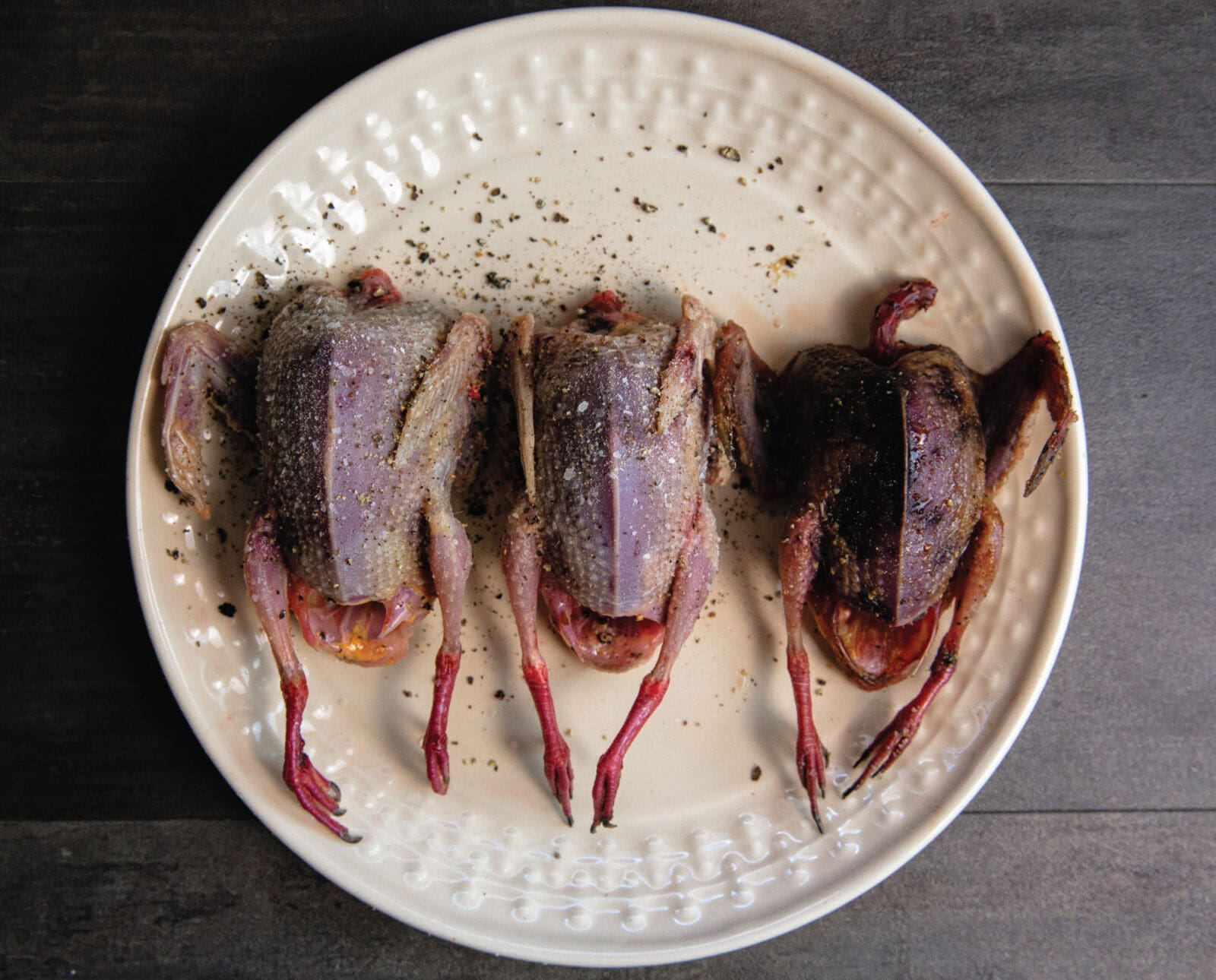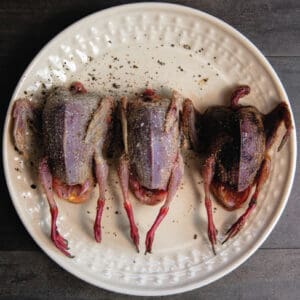Home » Small Game Cooking » How and Why You Should Age Your Doves
How and Why You Should Age Your Doves

Jack Hennessy grew up in the South Suburbs of Chicago…
Discover the benefits of aging dove meat for richer flavor. Learn how to age dove meat effectively and elevate your culinary experience.
If you’ve grown tired of bacon-wrapped jalapeño dove poppers, here’s a solution: roast a whole, skin-on dove that has been aged for five days. With any game meat, aging both tenderizes meat and concentrates flavor. When wild game is aged, seasoned, and cooked properly, the end result is something I promise you will never forget—much unlike those poppers we inhale every September.
Aging allows moisture to evaporate from the meat over an extended time. It’s the same concept as reducing a sauce: let moisture evaporate to build bold flavor. Aging concentrates flavor and allows naturally-occurring enzymes to denature protein molecules, thus tenderizing meat.
Generally speaking, the larger the game, the longer you age it. I have heard of some folks aging big whitetail bucks for as long as a month. I’ve aged roosters for as many as ten days. Five days seems to be the sweet spot for dove. When served medium-rare, the flavor is almost nutty, sweet, and deep, the taste that makes you close your eyes and focus solely on what is happening between your molars.
How to Best Preserve Dove in the Field
Dove season is often warm. Red-meat game is best aged at temps no higher than 40 degrees Fahrenheit. If you’re going dove hunting for a full morning or evening in warm temps, I always recommend bringing a quality cooler. You also want to keep the birds cool and dry. Kenai makes quality insulated coolers, but the simplest, most-effective accessory they offer is a basket you can hang above the ice. Using a Styrofoam board on top of ice with your cooler’s drain plug removed can also work. Just remember it’s going to drip water.
When and How to Pluck a Dove
Doves are likely one of the easiest game birds to pluck. Pinch those feathers between your index finger and thumb and lightly rip against the grain. They come off very easily on the first day while they’re still warm. However, a plucked bird may dry out quicker than preferred while aging, so I might wait until the second or third day to pluck my doves if I’m aging them. However, waiting until day five means dealing with gummy skin due to moisture evaporation. I recommend that you pluck your aging doves on day two or three.
How to Age Doves at Home
I firmly believe in using kitchen refrigerators for aging red-meat cuts and whole birds. Your kitchen refrigerator likely hovers between 30 and 50 percent humidity, meaning it’s pretty dry. For context, the average humidity for aging beef or venison is 70 percent. When doves sit unplucked for a couple of days in the fridge, the meat retains moisture. When plucked on day two and seasoned on day four, we ensure the bird has been adequately aged and that the skin is dry, resulting in crispy skin when roasted at high heat.
However, if you have a quality cooler and don’t want to age birds in the fridge, pluck your birds on day one and add them to a metal rack or Styrofoam cover to keep them dry for five days. Just leave the cooler’s plug out and add fresh ice as necessary. That cooler will likely stay between 60 and 75 percent humidity.
How to Cook an Aged Dove
Use your favorite spice mix, or consider the following.

Roasted or Grilled Aged Dove with Homemade Rub
Ingredients
- Plucked, aged, skin-on whole doves
- ½ cup kosher salt
- ¼ cup brown sugar
- 2 tbsp freshly cracked black pepper
- Peanut oil or other high-heat oil
Instructions
- Mix the spices thoroughly.
- Twenty-four hours before roasting or grilling, lightly coat all the doves with the rub and put them in the fridge.
- Pull doves out of the fridge for 2 hours before cooking. Lightly coat with peanut oil or other high-heat cooking oil.
- Roast or grill at 500 F, making sure to rotate the birds on all sides if you’re grilling them, for 3 minutes. Let the doves rest for 2-3 minutes before serving.
Notes
Jack Hennessy grew up in the South Suburbs of Chicago and didn't start hunting until he attended graduate school in Spokane, Washington, at the age of 26. Hennessy began work in professional kitchens in high school but didn't start writing wild game recipes until he joined the Spokesman-Review in 2014. Since then, his recipes have appeared with Petersen's Hunting, Backcountry Journal, Gun Dog Magazine, among many others. He now lives with his Wirehaired Vizsla, Dudley, in Wichita, Kansas.




This doesn’t mention cleaning the bird, do you remove the entrails prior to aging?